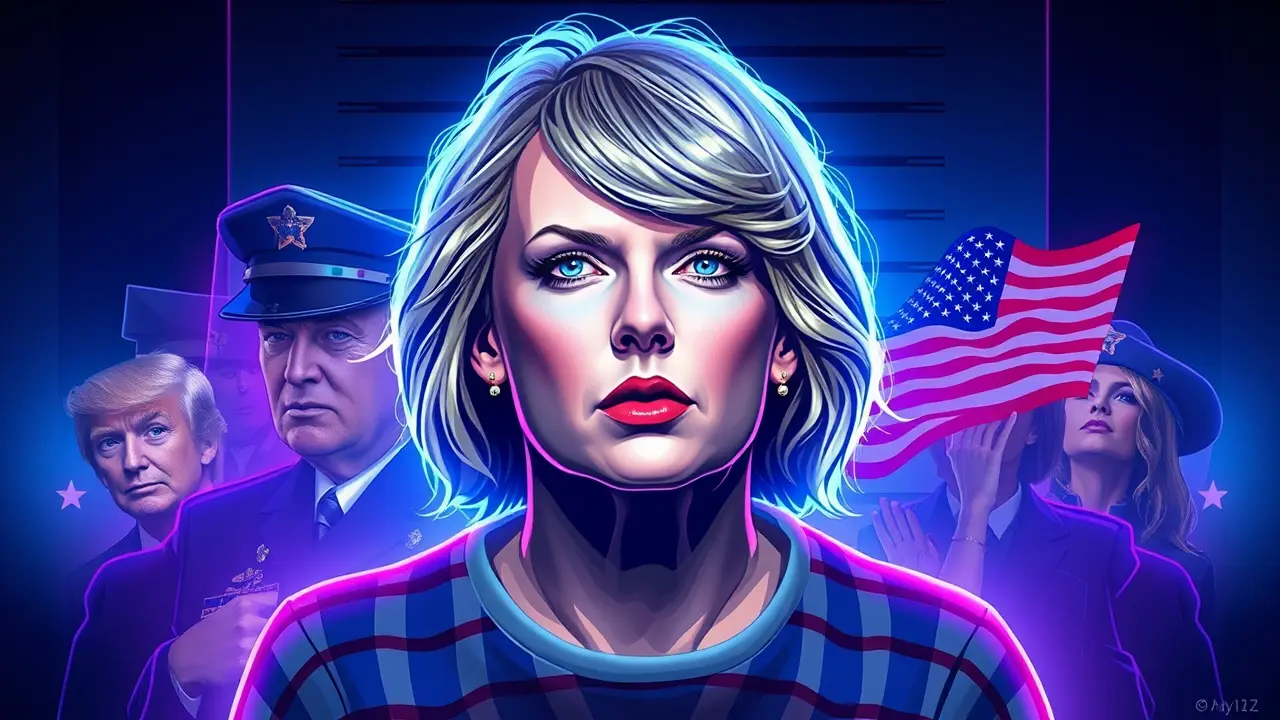
Politicscorruption & scandalsResignations after Scandals
Trump Uses Taylor Swift Song in TikTok Video Featuring Mugshot
BR
Brian Miller
11 hours ago7 min read3 comments
In a move that feels less like a political strategy and more like a desperate grab for relevance on the TikTok charts, Donald Trump’s campaign has co-opted the sonic landscape of Taylor Swift’s 'Life of a Showgirl,' audaciously reimagining it as 'The Fate of America' in a new video. This isn't just background music; it's a full-blown, jarring remix where the song's original narrative of performance and spectacle is brutally twisted to frame Trump's own legal and political drama as a national epic.The video is a chaotic playlist of imagery, cutting from stark, propagandistic shots of military might to the now-iconic, somber mugshot from his Fulton County booking, each frame meticulously synced to lyrics that now carry a weight their writer never intended. It’s a cultural collision that demands a closer listen, a dissection of how political operatives are increasingly treating the pop charts as a new battleground.To understand the sheer audacity of this move, one must first appreciate the original artist's domain. Taylor Swift isn't just a musician; she is a curator of modern myth, a storyteller whose albums function as cultural touchstones.'Life of a Showgirl,' from her earlier catalog, explores the duality of public performance and private reality, a theme Trump's team has hijacked to paint his indictments not as legal accountability but as acts in a grand, persecuted performance for the nation. The choice is deeply cynical, an attempt to cloak a contentious political figure in the emotional resonance and widespread appeal of an artist who has meticulously built a brand on authenticity and a carefully managed relationship with her fans.This is not the first time a politician has reached for a pop anthem—think of Reagan misappropriating Springsteen's 'Born in the U. S.A. ' or Bill Clinton's saxophone-backed use of Fleetwood Mac—but the Trump campaign's method feels distinctly of this digital era.It’s less a request for endorsement and more a forced marriage of aesthetics, leveraging the algorithm-driven virality of TikTok to bypass traditional media gatekeepers and speak directly to a younger, politically fluid demographic. The platform's format, built on quick cuts, trending audio, and meme culture, is the perfect vehicle for such a message, reducing complex political narratives to a visceral, shareable sixty-second clip.The inclusion of the mugshot is particularly telling, transforming a symbol of legal consequence into a badge of honor, a campaign logo for an insurgency. Set against lyrics from a song about the 'life of a showgirl,' the image is re-contextualized as just another costume, another role in the relentless show of politics.This is where the strategy reveals its core: it’s a power play in the attention economy. In a media landscape saturated with information, capturing eyeballs is currency, and what better way to do so than by fusing the gravitational pull of a pop superstar with the perpetual drama of a presidential campaign? The campaign is betting that the controversy and conversation generated will outweigh any potential backlash from Swift’s loyal fanbase, the 'Swifties,' who are notoriously protective of her work and its meaning.The historical precedent for such musical appropriation is fraught with tension. From the ongoing battles between politicians and artists like Neil Young and the Rolling Stones over song usage, to the more recent clashes with Pharrell and Adele, the history is clear: artists rarely appreciate their art being used to endorse candidates they may not support.The legal frameworks, often relying on blanket licensing agreements through platforms like BMI or ASCAP, provide a loophole that campaigns exploit, allowing them to use a song so long as the venue holds a license, a rule stretched to its limit in the digital realm. The ethical dimension, however, remains murky.It raises fundamental questions about artistic integrity and the right of a creator to control the context in which their work is presented. While Swift has remained silent on this particular usage, her history of reclaiming her masters and asserting creative control suggests this is not a tactic she would endorse.The potential consequences are multifaceted. On one hand, it could further energize Trump's base, who may see the video as a defiant and clever piece of political theater.On the other, it risks alienating moderate voters and mobilizing Swift's immense following against him, a demographic with significant electoral power. Furthermore, it sets a dangerous new normal for political communication, where the emotional shorthand of popular music is weaponized to simplify and distort complex issues.Expert commentary from musicologists and political strategists would likely highlight this as a watershed moment. It signifies the final blurring of lines between entertainment and politics, where campaign strategy is indistinguishable from content creation.The analysis isn't just about one video; it's about the future of political persuasion in a post-broadcast, algorithmically curated world. The Trump campaign, in using a Swift song, isn't just playing a track; it's attempting to score the soundtrack to its own narrative, betting that the beat of a pop song can drown out the discord of political reality. As the video circulates, racking up views and sparking debate, it becomes clear that this is more than a campaign ad—it's a statement on the power of music, the nature of celebrity, and the unsettling new rules of engagement in American politics.
#featured
#Donald Trump
#Taylor Swift
#TikTok
#mugshot
#political campaign
#celebrity feud
#social media
Stay Informed. Act Smarter.
Get weekly highlights, major headlines, and expert insights — then put your knowledge to work in our live prediction markets.
© 2025 Outpoll Service LTD. All rights reserved.